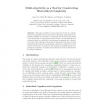Free Online Productivity Tools
i2Speak
i2Symbol
i2OCR
iTex2Img
iWeb2Print
iWeb2Shot
i2Type
iPdf2Split
iPdf2Merge
i2Bopomofo
i2Arabic
i2Style
i2Image
i2PDF
iLatex2Rtf
Sci2ools
GECCO
2003
Springer
2003
Springer
Multi-objectivity as a Tool for Constructing Hierarchical Complexity
Abstract. This paper presents a novel perspective to the use of multiobjective optimization and in particular evolutionary multi-objective optimization (EMO) as a measure of complexity. We show that the partial order feature that is being inherited in the Pareto concept exhibits characteristics which are suitable for studying and measuring the complexities of embodied organisms. We also show that multi-objectivity provides a suitable methodology for investigating complexity in artificially evolved creatures. Moreover, we present a first attempt at quantifying the morphological complexity of quadruped and hexapod robots as well as their locomotion behaviors.
Concept Exhibits Characteristics | Evolutionary Multi-objective Optimization | GECCO 2003 | Partial Order Feature |
Related Content
| Added | 06 Jul 2010 |
| Updated | 06 Jul 2010 |
| Type | Conference |
| Year | 2003 |
| Where | GECCO |
| Authors | Jason Teo, Minh Ha Nguyen, Hussein A. Abbass |
Comments (0)

